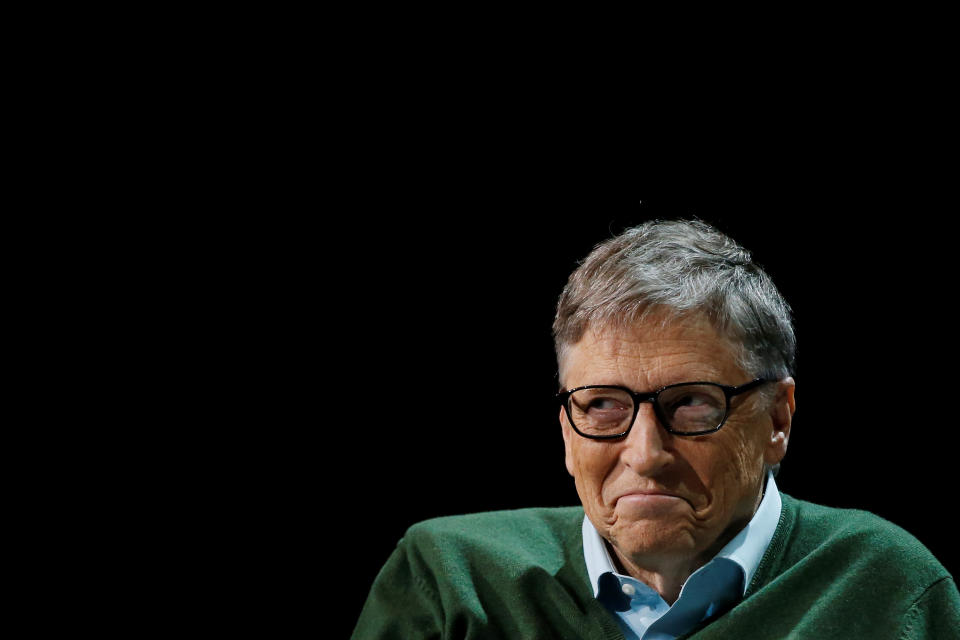Bill Gates calls COVID-19 vaccine conspiracy theories 'wild' and 'unexpected'
As coronavirus cases spike around the world, Facebook (FB) and other social networks have exploded with conspiracy theories regarding efforts to find a vaccine, including false claims of a plot to bury research showing vaccines can hurt people’s immune systems.
Microsoft (MSFT) co-founder and former CEO Bill Gates, who’s been targeted by vaccine conspiracy theorists, says these “wild stories” raise concerns about people’s willingness to take a vaccine when it finally becomes available to the general public.
“You know, we've always had some wariness...about vaccines, but not this idea of connecting them to a plot, you know, like microchipping people to track them or, you know, things that...even in a fiction story, it wouldn't be all that believable,” Gates, the co-chair of the Bill and Melinda Gates Foundation, told Yahoo Finance Editor-in-Chief Andy Serwer in an interview that aired during Yahoo Finance’s All Markets Summit on Monday.
‘A wild new element I wouldn’t have expected’
Gates has spoken out about following appropriate medical advice on the coronavirus. But he said he was still surprised to find himself, as well as Dr. Anthony Fauci, the nation’s top infectious disease expert, linked to conspiracies about attempts to develop a vaccine.
“The wave of wild stories about the vaccine, that it's, you know a conspiracy, it's based on evil intent, often referring to either myself or Dr. Fauci, that is a wild new element that I wouldn't have expected,” Gates said, in an interview taped on Oct. 15.

The fear about such conspiracies, which have spread like wildfire across social networks including Facebook, Instagram, Google-owned YouTube (GOOG, GOOGL), Twitter (TWTR), and others, is that they will lead to people forgoing vaccinations and refusing to wear masks or take other preventative measures.
“You do have to ask, is that gonna mean things like mask wearing or, uh, willingness to take the vaccine are affected,” Gates said. “I'm still hopeful that, you know, there’s 30% of the population who understands this is to benefit other people, and so they'll go first.”
Lies about the coronavirus, whether about its origins, treatments, mitigation efforts or vaccine candidates, began cropping up on social media sites in the early months of the pandemic. Various theories range from fabricated claims that the virus came from a lab in China to the outright lie that masks are ineffective at stopping the spread of the virus.
During a Senate Commerce Committee hearing featuring the CEOs of Google, Twitter, and Facebook on Wednesday, Senator Richard Blumenthal (D-CT) raised his own concerns about President Donald Trump using social media sites to spread virus disinformation. The lawmaker referred to a video Trump posted to Facebook and Twitter from a Fox News interview in which he, without evidence, claimed children were immune to the coronavirus.
“He has said that children...are almost immune from this disease,” Blumenthal said.

Both Twitter and Facebook subsequently took the video down for violating their rules against misinformation surrounding the virus.
In his interview with Yahoo Finance, Gates acknowledged that social media sites are “doing more” to mitigate the spread of misinformation. YouTube said this month that it would remove misleading information about any potential coronavirus vaccine, after previously saying it would also take down content promoting phony treatments for the virus.
Facebook, meanwhile, said that it would reject all ads that discourage people from getting vaccinated globally. The site, however, isn’t banning posts about conspiracies, though.
Sign up for Yahoo Finance Tech newsletter
Twitter has also taken steps to fight virus misinformation, taking aim at posts about the virus and adding fact check marks to false tweets. In May, both Facebook and Twitter also removed a now-infamous “Plandemic” conspiracy theory video claiming well-known people were exploiting the coronavirus pandemic for their own personal gain.
But the deluge of fake content continues to pour in from around the world thanks, in part, to the massive scale of these companies. And it’s not just a problem unique to the U.S. According to a September analysis by The Guardian, engagement with U.K. anti-vaccine posts on Facebook tripled in one month, between July and August.
Despite the prevalence of this misinformation, Gates hopes the truth of the pandemic is more compelling than the fictions spreading across the internet, and that people are more than willing to get the vaccine to stop the virus’s exponential spread.
“I hope we can get the truth to be more interesting than the, you know, [the] sort of over simplistic explanation of what's going on with this pandemic,” he said.
Got a tip? Email Daniel Howley at dhowley@yahoofinance.com over via encrypted mail at danielphowley@protonmail.com, and follow him on Twitter at @DanielHowley.
Read more Tech Support stories here.
More from Dan:
Facebook, Twitter, and Google need to answer for disinformation — not a fake anti-conservative bias
What is section 230, the controversial internet law Trump wants to dismantle
Microsoft Q1 2021 earnings beat expectations on cloud strength
Follow Yahoo Finance on Twitter, Facebook, Instagram, Flipboard, SmartNews, LinkedIn, YouTube, and reddit.





